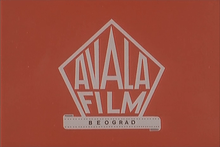Avala Film
Avala Film (Serbian Cyrillic: Aвала филм) is a Serbian film studio, founded in 1946 as the first studio founded in post-war Yugoslavia. It is currently declared bankrupt.
 Avala Film 1973 logo | |
| Industry | Film |
|---|---|
| Founded | 15 July 1946 |
| Headquarters | Filmski Grad, Kneza Višeslava 88, , |
Area served | Worldwide |
Key people | Ranko Petrić (chairman) |
| Products | Motion pictures |
| Total assets | 105,000,000 Euro (2011 estimate)[1] |
| Website | www |
Overview
In June 1946, the government of the Socialist Federal Republic of Yugoslavia created the State Committee of Cinematography, in order to replace the provisional Film Enterprise of the SFRY. The Committee set out to establish film production companies in the various constituent states of Yugoslavia: the first and the largest of those was Avala Film, in the Socialist Republic of Serbia's capital Belgrade, which was founded on 15 July. The company was located in the future complex of Filmski Grad, which the Committee had only begun planning.[2]
In 1947, Avala Film produced the first feature film made in postwar Yugoslavia, Vjekoslav Afrić's Slavica.[3] Until 2000, the studio participated in the creation of 400 documentaries, 200 feature films and 120 co-productions with foreign companies; its pictures won more than 200 awards in various festivals.[4][5]
After the Breakup of Yugoslavia, the studio was partially privatized and 51% of its shares were sold to a company called Yugoexport, while the rest were retained by Avala Film's management.[6] Since the mid-1990, it has produced few films, and its last one - Shadows of Memories - was released in 2000. The studio is facing financial troubles, and was threatened with liquidation after Yugoexport was declared bankrupt.[7] Since 2005, plans to fully privatize it were proposed, but not carried out.[7] In June 2011, the studio was announced to be bankrupt, after accumulating a debt of 111,000,000 Serbian dinar.[8] In early 2012, the Serbian government announced plans to revitalize Avala Film.[9] but assistance never materialized. The company's real estate, film rights, costumes, props and studios were scheduled to be sold-off in spring 2013.[10]
Selected filmography
- 1953 - Perfidy.
- 1957 - Priests Ćira and Spira.
- 1961 - Siberian Lady Macbeth
- 1964 - March on the Drina (Mars na Drinu)
- 1965 - Three.
- 1966 - The Dream.
- 1967 - I Even Met Happy Gypsies.
- 1968 - It Rains in My Village.
- 1970 - Liberation.
- 1987 - Reflections.
- 1989 - The Meeting Point.
Selected international co-productions
- 1954 - The Last Bridge
- 1962 - Taras Bulba
- 1963 - The Long Ships
- 1964 - Marco the Magnificent (La Fabuleuse aventure de Marco Polo)
- 1965 - Genghis Khan
- 1967 - The 25th Hour
- 1968 - Kelly's Heroes
- 1969 - Castle Keep
- 1972 - England Made Me
- 1984 - Quo Vadis? (miniseries)
- 1986 - Escape from Sobibor (TV movie)
- 1987 - The Fortunate Pilgrim (miniseries)
- 1987 - Crusoe
- 1988 - Around the World in 80 Days (miniseries)
- 1989 - Boris Godunov
References
- The Rich Prey Avala Film. politika.sr, 11 April 2011.
- Daniel J. Goulding. Liberated Cinema: The Yugoslav Experience, 1945-2001. Indiana University Press (2002). ISBN 978-0253215826. pp. 3-4.
- Miera Liehm, Antonin J. Liehm. The Most Important Art: Soviet and Eastern European Film After 1945. University of California Press (1977). ISBN 0-520-04128-3. p. 129.
- Avala Film on the Serbian Film Commission's website Archived June 29, 2010, at the Wayback Machine.
- Avala Film Facing Bankruptcy Archived August 25, 2011, at the Wayback Machine. Pravda Belgrade, 16 February 2011.
- Hollywood, the Serbian Way. novosti.rs, 1 April 2010.
- Avala Film Threatened by Going Bankrupt. novosti.sr., 15 March 2011.
- Avala's Assets exceed its Debt. Pravda Belgrade, 6 July 2011.
- Government will Aid Avala Film. Archived 2016-03-03 at the Wayback Machine bts.sr., 9 January 2012.
- "Tito's pet film studio at risk of Yugoslav fate" Reuters, by Matt Robinson, 7 March 2013
External links
- Website
- Avala Film on the IMDb.
- A short history of the studio.